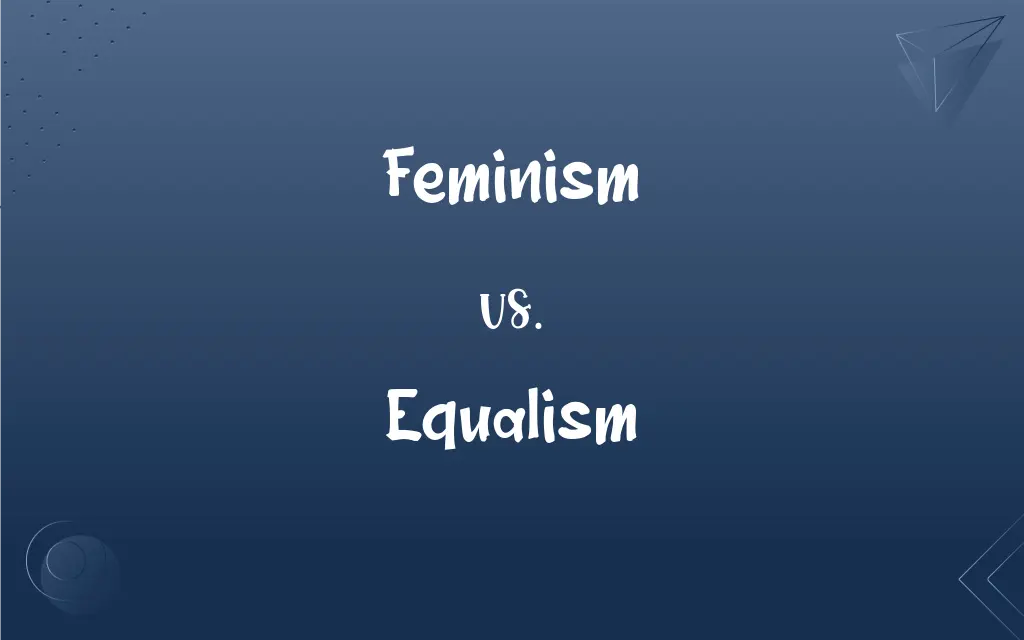Feminism vs. Equalism: What's the Difference?
Edited by Aimie Carlson || By Janet White || Published on November 14, 2023
Feminism advocates for women's rights on the grounds of gender equality, while Equalism seeks equality for all, regardless of gender, race, or class.

Key Differences
Feminism is a movement and ideology that focuses on advocating for women's rights, aiming to achieve gender equality. Equalism, on the other hand, is a broader philosophy that believes in equal rights and opportunities for everyone, irrespective of their gender, race, or class.
Feminism emerged historically in response to systemic oppressions faced by women, seeking to challenge and eliminate barriers, prejudices, and inequalities. Equalism, while acknowledging the same issues, extends its concern to all forms of discrimination and inequality faced by any group.
The term "Feminism" inherently emphasizes the female perspective and addresses the patriarchal structures that have historically marginalized women. Equalism, in contrast, doesn’t highlight any specific group's plight but rather promotes the idea that everyone should be treated equally.
While both Feminism and Equalism strive for fairness and justice, their approaches might differ. Feminism might specifically support female-centric policies or campaigns, while Equalism would support initiatives that level the playing field for everyone.
Feminism has a rich history of activism, scholarship, and social change spanning multiple waves, each with distinct goals and methods. Equalism, while not as historically documented as Feminism, emphasizes a universal approach to achieving fairness and justice for all.
ADVERTISEMENT
Comparison Chart
Primary Focus
Advocates for women's rights
Advocates for equal rights for everyone
Historical Context
Emerged due to systemic oppressions faced by women
General philosophy of equality for all groups
Specificity
Focuses on female perspective
Does not emphasize any specific group
Examples of Initiatives
Women's suffrage, equal pay
Anti-discrimination laws for gender, race, class
Underlying Principle
Challenge and change patriarchal structures
Universal equality and fairness for all
ADVERTISEMENT
Feminism and Equalism Definitions
Feminism
The advocacy of women's rights based on the equality of the sexes.
Her passion for feminism was evident when she led the campaign for equal pay.
Equalism
The belief that all people should be treated equally regardless of differences.
His dedication to equalism was seen in his efforts to promote inclusive policies.
Feminism
A movement to end gender-based inequalities.
The rise of feminism in the 20th century paved the way for significant societal change.
Equalism
A philosophy advocating for equal rights and opportunities for all.
The company, driven by equalism, ensured diversity in its hiring process.
Feminism
A belief in the social, political, and economic equality of the sexes.
Feminism teaches us to challenge traditional gender roles.
Equalism
A stance against any hierarchical structures based on inherent traits.
The spirit of equalism was evident in the community's collaborative decision-making.
Feminism
The theory of political, economic, and social equality of the sexes.
Her studies in feminism shaped her views on workplace dynamics.
Equalism
The pursuit of eliminating discrimination based on gender, race, or class.
The new curriculum, inspired by equalism, included texts from diverse authors.
Feminism
A fight against patriarchal norms and structures.
Feminism encourages both men and women to question societal expectations.
Equalism
An ideology that opposes any form of discrimination or oppression.
The rally for equalism attracted thousands who believed in a fair society.
Feminism
Belief in or advocacy of women's social, political, and economic rights, especially with regard to equality of the sexes.
Equalism
Synonym of egalitarianism
Feminism
The movement organized around this belief.
Equalism
The policy or practice of treating all things equally.
Feminism
(obsolete) The state of being feminine; femininity.
Equalism
The idea that emerging technologies will put an end to social stratification.
Feminism
A social theory or political movement which argues that legal and social restrictions on women must be removed in order to bring about equality of the sexes in all aspects of public and private life.
Feminism
A doctrine that advocates equal rights for women
Feminism
The movement aimed at equal rights for women
FAQs
What does Equalism stand for?
Equalism stands for equal rights and opportunities for everyone, irrespective of their gender, race, or class.
When did Feminism begin?
Feminism has roots in ancient times, but it notably gained momentum during the 19th and 20th centuries.
How does Equalism tackle discrimination?
Equalism promotes initiatives and policies that ensure fairness for everyone, regardless of their inherent traits.
What is Feminism primarily concerned with?
Feminism primarily advocates for women's rights and gender equality.
Does Equalism downplay the struggles of specific groups?
No, Equalism seeks equality for all and recognizes the unique challenges faced by various groups.
Are Feminism and Equalism the same?
No, while both advocate for equality, Feminism focuses specifically on gender issues, while Equalism has a broader scope.
Can someone support both Feminism and Equalism?
Yes, many people support both Feminism's goal of gender equality and Equalism's broader pursuit of universal equality.
Why is Feminism so important?
Feminism addresses and challenges systemic gender-based oppressions and inequalities.
How does Equalism address racial inequalities?
Equalism opposes any form of discrimination, including racial, and supports policies promoting racial equality.
What are the waves of Feminism?
Feminism has multiple waves, each with distinct goals, including suffrage, workplace rights, and societal roles.
What does Equalism say about gender roles?
Equalism opposes strict gender roles, advocating for freedom for individuals to define themselves.
Is Equalism a political movement?
Equalism is a philosophy that can influence political decisions, but it's not limited to politics.
How can one promote Equalism in everyday life?
By advocating for fairness, challenging discrimination, and promoting inclusive policies and behaviors.
Is Equalism a recent concept?
While the term might be newer, the idea of universal equality has ancient roots.
Can a man be a feminist?
Absolutely, Feminism supports equality, and anyone, regardless of gender, can advocate for it.
Is Feminism only relevant in certain parts of the world?
No, Feminism addresses issues relevant in every culture and society, though its focus might differ based on context.
Do all feminists share the same beliefs?
No, Feminism is diverse, and feminists might have different priorities and methods.
Can Equalism coexist with movements like Feminism and Civil Rights?
Yes, Equalism can coexist with and even support specific equality movements.
How has Feminism evolved over time?
Feminism has evolved through different waves, each addressing the specific needs and challenges of its time.
Is Feminism anti-men?
No, Feminism is pro-equality and challenges oppressive structures, not men as a group.
About Author
Written by
Janet WhiteJanet White has been an esteemed writer and blogger for Difference Wiki. Holding a Master's degree in Science and Medical Journalism from the prestigious Boston University, she has consistently demonstrated her expertise and passion for her field. When she's not immersed in her work, Janet relishes her time exercising, delving into a good book, and cherishing moments with friends and family.
Edited by
Aimie CarlsonAimie Carlson, holding a master's degree in English literature, is a fervent English language enthusiast. She lends her writing talents to Difference Wiki, a prominent website that specializes in comparisons, offering readers insightful analyses that both captivate and inform.































































